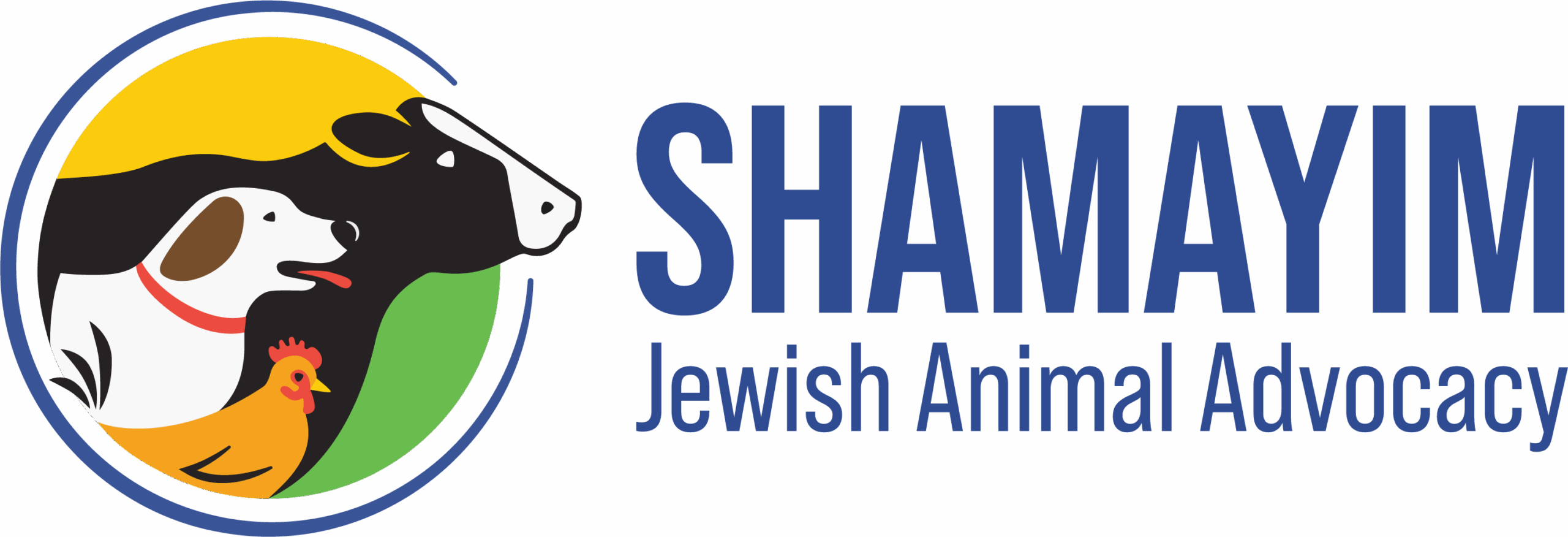The Synagogue Vegan Challenge

Mission Statement:
The goal of the Synagogue Vegan Challenge is simple: to provide training, education, and funding for Jewish communities to incorporate vegan programming! This adventure is easy, spiritually uplifting, and delicious. Participating communities will have the opportunity to receive grants for implementation of vegan food and education centered around animal advocacy. Throughout the year, the selected synagogues will serve plant-based meals at least once a month and provide educational opportunities to their community. Synagogues must host at least one vegan event a month. Each synagogue will be reimbursed for prior- approved vegan food programs over the course of the year. This will only be reimbursed with acceptable documentation and receipts.
Application for 2025- 2026 Synagogue Vegan Challenge
- Application deadline: July 15, 2025
- Program Timeline: August 2025- Summer 2026
- Application process: Apply –> Virtual Interview –> Orientation –> Program begins August 2025
- For more information, including Policies & Procedures, and FAQ’s, please scroll further down this page. Still have questions? Contact us here.
Frequently Asked Questions:
Find some FAQ’s below. Please email Contact us with any additional questions!
What is the Synagogue Vegan Challenge?
The Synagogue Vegan Challenge provides your synagogue with money and training to plan vegan events throughout the course of the year. To stimulate interest and incentive, we’re offering grants to participating synagogues who undertake this (fun & delicious) challenge!
Sounds interesting! How do I apply?
Apply using the form on our website: The Synagogue Vegan Challenge
If my synagogue is accepted, what happens next?
Congratulations on being accepted! Once your synagogue is chosen and terms are agreed to, you will begin meeting with the other members of your cohort and receive training to commence planning your events. Some fun ideas that fulfill the criteria of the grant could be:
– Host a vegan catered Shabbat (or, have community members bring their own unique creations!).
– Show a film promoting animal welfare and discuss it afterwards.
– Tie a Jewish holiday celebration to the values of eating plant-based and caring for animals.
– Hold a learning session featuring source sheets from the Shamayim website.
The key is to be creative! We look forward to seeing how individual communities engage in animal welfare & vegan activities. You will fill out surveys and event reports so that we can learn about your programs and hear how your community is responding to being a member of this challenge.
Can the grant go towards non-food items?
The grant usually only covers the direct cost of food. If you have an idea on how you’d like to use the funding that pays for something other than food, please get approval from us first.
Does every meal have to be vegan if I am accepted into this program?
The requirement is to host one event a month with exclusively vegan food (no meat, dairy, eggs, or honey).
If my synagogue/community is selected for the Challenge, what materials will I have to provide you?
You will keep us updated about your monthly events. You will submit an event report. It will include a few pieces of information:
– All the receipts when you are requesting reimbursement.
– Photos of your recent event
– Reflections on how the program/event went.
What if I’m not vegetarian/vegan? Can I still apply?
Sure! We encourage everyone to apply who might see a benefit to reducing the amount of meat in their diet at the individual and communal level.
If I’m not a vegan, am I a bad person?
Absolutely not! This challenge is not meant to shame or make anyone feel bad about themselves. Rather, the reason we started this challenge is for Jewish communities to think more deeply about the nexus of animal welfare ethics, kashrut (kosher law), and compassion for all. We believe that by encouraging gentle, non-judgmental discussion and by showing how tasty and nutritious a plant-based diet can be, Jewish communities can reduce the amount of meat consumed within their community.
TERMS AND CONDITIONS FOR THE SYNAGOGUE VEGAN CHALLENGE
- You must host one fully vegan event per month from September 2025 to June 2026.
- Each event must incorporate an educational component focused on food justice (environmentalism, hunger, poverty, animals, health, etc.)
- The food that qualifies for reimbursement must be vegan. This means no meat, fish, dairy, eggs, or honey.
- This grant does not count towards alcohol purchases.
- Each synagogue must get approval before the event, and then submit an event report with receipts, photos, and summary for said event within 1 week of the event.
- Receipts, an event report, and at least 2 high quality pictures are required for reimbursement. These should be smiling, happy community members together, eating food, or participating in programming. If your observance keeps you from being able to use technology on holidays, you can take some ‘pre’ event photos, smiling while making food, or smiling with the set up/ decorations.
- Synagogue Vegan Challenge applicants and/or Rabbis/ Community leaders will attend the kickoff/ launch meeting with other participants in the program to introduce themselves and receive training from Shamayim.
Questions? Contact us!
Synagogue Vegan Challenge Alumni:

2024- 2025
Ayeka Paris, France Rabbanit Myriam Ackermann Sommer– Modern Orthodox
Based in Harlem- Harlem, New York, NY- Rabbi Dimitry Ekshtut- Pluralistic
Chevrei Tzedek – Baltimore, Maryland- Rabbi Maci Jacobs- Conservative
Jewish Community of Amherst – Amherst, MA- Rabbi Benjamin Weiner – Reconstructionist
Lawrence Jewish Community Congregation– Lawrence, KS- Lay- Led- Nondenominational
Moishe Pod Denver – Denver, CO- Lay led- Pluralistic
Temple Emanu-El – Providence, Rhode Island- Rabbi Michael Fel- Conservative
Temple Israel of Hollywood – Los Angeles, CA- Rabbi Calvin Dox-DaCosta, Senior Rabbi Mari Chernow- Reform
2023- 2024
The synagogues chosen for the seventh cohort of the Synagogue Vegan Challenge are:
Adat Shalom Synagogue- Rabbi Aaron Bergman, Rabbi Blair Nosanwisch- Farmington Hills, Michigan- Conservative
Temple Israel of Great Neck New York– Rabbi Howard Stecker/Rabbi Daniel Schweber- Conservative
Congregation Beth Shalom – Seattle- Rabbi Jill Borodin- Conservative
Congregation Beth Shalom– Carmichael, California- Rabbi Nancy Wechsler- Reform
Toronto Partnership Minyan– Toronto Canada- Rabbi Martin Lockshin- Partnership Orthodox
Congregation Shaarey Tikvah– Rabbi Scott Roland- Beachwood, OH- Conservative
The Selma and Lawrence Ruben Base NYC– powered by Moishe House- Rabbi Danny Stein- Pluralistic
Congregation Emanu El- Cantor Jennifer Bern-Vogel, Spiritual Leader- Redlands, CA- Reform
Chochmat HaLev- Rabbi Zvika Krieger- Berkeley, CA- Renewal Jewish
2022- 2023
The synagogues chosen for the sixth cohort of the Synagogue Vegan Challenge are:
Beth El East Windsor– Rabbi Matt Nover- East Windsor, New Jersey- Conservative
The Minyan Tzedek – Scottsdale, Arizona- Orthodox
Valley Beit Midrash– Rabbi Shmuly Yanklowitz- Scottsdale, Arizona – Non denominational
Shir Hatzafon- Rabbi Rebecca Lillian & Rabbi Sandra Kviat- Copenhagen, Denmark- Reform
Temple Israel- Cape Town, South Africa- Rabbi Greg Alexander- Progressive
Temple Beth Zion – Beth Israel (BZBI)– Rabbi Abi Weber- Philadelphia, Pennsylvania- Conservative
Ikar- Rabbi Zvi Zobin- Los Angeles, California- Unafilliated
Beth Shalom– Rabbi Sarit Horwitz- Memphis, Tennessee- Conservative
2021-2022
The eleven synagogues chosen for the fifth cohort of the Synagogue Vegan Challenge are:
Adath Shalom – Rabbi Moshe Rudin – Parsippany, NJ – USCJ – Conservative
Bais Abraham Congregation – Rabbi Garth Silberstein – St. Louis, MO – Modern Orthodox
Beth El Fairfield – Rabbi Joshua Ratner – Fairfield, CT – Conservative
Beth El Synagogue – Rabbi Steven Abraham – Omaha, NE – Conservative
Central Synagogue – Beth Emeth – Rabbi Michael G Cohen – Rockville Centre, NY – Dual-Affiliated = Reform and Reconstructionist
Chadeish Yameinu Jewish Renewal Congregation Santa Cruz – Rabbi Eli Cohen – Santa Cruz, CA – Affiliated with ALEPH, The Alliance for Jewish Renewal.
Congregation Beth El – Rabbi Ron Koas, Rabbi Arthur Ruberg, Rabbi Emeritus – Norfolk, VA – Conservative
Congregation Beth El-Keser Israel – Rabbi Eric Woodward – New Haven, CT – Conservative
Mekor Habracha/Center City Synagogue – Rabbi Eliezer Hirsch – Philadelphia, PA – Modern Orthodox
Temple Isaiah – Rabbi Dara Frimmer – Los Angeles, CA – Conservative
Temple Sholom of Chicago – Rabbi Rena Singer and Rabbi Shoshanah Conover – Chicago, IL – Reform
2020-2021
The six synagogues chosen for the fourth cohort of the Synagogue Vegan Challenge are:
Beth Chayim Chadashim – Rabbi Jillian R. Cameron & Cantor Juval Porat – Los Angeles, CA – Reform
Congregation Shaarei Kodesh – Rabbi David Baum – Boca Raton, FL – Conservative
Monmouth Reform Temple – Rabbi Marc Kline – Tinton Falls, NJ – Reform
Temple Chai – Rabbi Mari Chernow and Rabbi Bonnie Koppell – Phoenix, AZ – Reform
Temple Solel – Rabbi Efrat Zarren-Zohar (acting) – Hollywood, FL – Reform
The YM and YWHA of Washington Heights and Inwood – Rabbi Ari Perten – New York, NY – Community Center
2019-2020
Read about the events held by our 2019 – 2020 SVS participants here.
The five synagogues chosen for the third cohort of the Synagogue Vegan Challenge are:
Sixth & I – Rabbi Jesse Paikin & Rabbi Shira Stutman – Washington, D.C. – Non-denominational
Congregation Bonai Shalom – Rabbi Marc Soloway – Boulder, CO – Conservative
Congregation Beth Sholom – Rabbi Barry Dolinger – Providence, Rhode Island – Modern Orthodox
Chabad of Potomac – Rabbi Mendel Bluming – Potomac, Maryland – Orthodox
B’nai Jeshurun – Roly Matalon, Felicia Sol, Erin Glazer – New York, NY – Unaffiliated
2018-2019
The five synagogues chosen for the second cohort of the Synagogue Vegan Challenge are:
Romemu – Rabbi David Ingber – New York, NY – Non-denominational/Renewal
Congregation Rodef Shalom – Rabbi Rachel Kobrin – Denver, CO – Conservative
OHEL – Rabbi David Paskin – Boca Raton, FL – “Underconstructionist”/Pluralistic
Skokie Valley Agudath Jacob – Rabbi Ari Hart – Skokie, IL – Modern Orthodox
Ohef Sholom Temple – Rabbi Rosalin Mandelberg – Norfolk, VA – Reform
2017 – 2018
The five synagogues that participated in the first cohort of the Synagogue Vegan Challenge are:
Temple Beth Sholom of the East Valley – Rabbi Kenneth R. Leitner – Chandler, AZ – Conservative
Temple of Aaron – Rabbi Jeremy Fine – St. Paul, MN – Conservative
Makom: Creative Downtown Judaism – Rabbi Aaron levy – Toronto, Canada – Pluralistic
Temple Beth Tikvah – Rabbi Alexandra Shuval-Weiner – Roswell, GA – Reform
Vegan Synagogue Without Walls – Lisa Rosenblatt – Chicago, IL – Nondenominational
